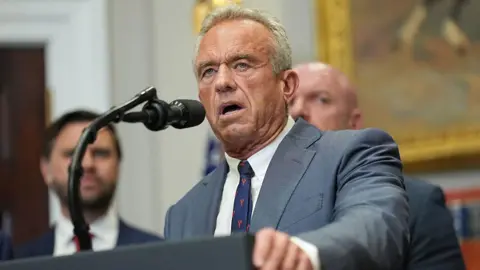Robert F. Kennedy Jr., the U.S. Secretary of Health and Human Services, has made a controversial decision to pull $500 million in funding dedicated to the development of mRNA vaccines. This funding, initially designated for developing vaccines against serious respiratory viruses, including COVID-19 and seasonal flu, is expected to affect 22 projects spearheaded by major pharmaceutical manufacturers like Pfizer and Moderna. The announcement reflects Kennedy’s longstanding skepticism regarding the risk-benefit balance associated with mRNA technology.
Kennedy stated that his decision to cancel the funding emerged from an in-depth review of scientific data, asserting that the risks posed by mRNA vaccines outweigh any potential benefits. This viewpoint has sparked a wave of criticism from the medical community and health experts, who point to the extensive research supporting the safety and efficacy of mRNA vaccines. For instance, the rapid development and deployment of these vaccines have played a pivotal role in controlling the spread of COVID-19, preventing severe illness, and ultimately saving millions of lives.
Dr. Paul Offit, the director of the Vaccine Education Center at the Children’s Hospital of Philadelphia, voiced concerns about Kennedy’s stance, asserting that it places the U.S. in a vulnerable situation regarding future pandemic preparedness. He noted that mRNA vaccines facilitate a quick response in public health crises due to their shorter development timelines, a feature that was crucial during the COVID pandemic.
In his statement explaining the funding shift, Kennedy claimed the objective is to transition towards “safer, broader vaccine platforms” that can remain effective despite viral mutations. However, experts like Dr. Offit counter this by asserting that mRNA vaccines have proven to be remarkably safe and critical for preventing severe diseases linked to various viruses, including COVID-19.
While Kennedy’s department, the Biomedical Advanced Research and Development Authority (BARDA), aims to prioritize platforms with better safety records and more transparent clinical data, many argue that the mRNA technology used by Moderna and Pfizer has already undergone rigorous testing with thousands of participants. The consensus among medical professionals is that these vaccines have been demonstrated to be both safe and effective.
Since taking office, Kennedy has been actively reshaping the approach of the federal health department toward vaccinations. Notably, he made headlines in June by terminating 17 members of a committee responsible for issuing public health recommendations for immunizations. He replaced them with individuals who have publicly expressed skepticism about vaccine safety and effectiveness.
Additionally, he recently removed COVID-19 vaccinations from the recommended immunization schedule for healthy children and pregnant women, further signaling a potential pivot in U.S. vaccination policies under his leadership.
Overall, the decision to withdraw the substantial funding for mRNA vaccine development raises significant questions about the future trajectory of vaccine research and public health policy. It highlights the ongoing debates surrounding vaccine safety, efficacy, and regulatory approaches, particularly in the context of emerging pathogens. As the medical community continues to advocate for the benefits of mRNA technology in combating infectious diseases, the implications of Kennedy’s actions may resonate through future public health strategies and the nation’s pandemic preparedness endeavors.












